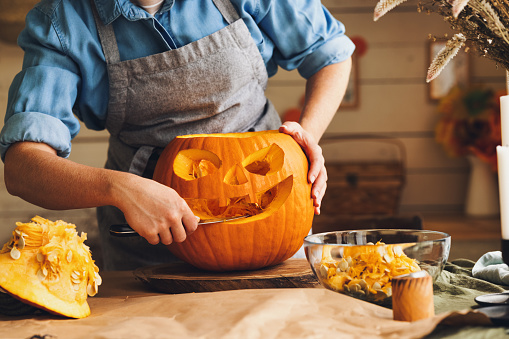5 Ways to Ease Anxiety During Halloween
5 Ways to Ease Anxiety During Halloween
For some, haunted houses and scary movies can trigger a response that isn’t fun. In fact, they can cause feelings of anxiety.
“Halloween activates that sense of someone being in danger and being surprised and caught unaware,” says Dr. Lauren Cook, a therapist, speaker, and author. “That ignites tribal fear of human survival… People aren’t making this up. It’s happening on a biological level.”
Why some people get spooked more easily than others depends, to some extent, on how they’re wired.
1.The science behind fear
Fear starts in your brain. The brain circuit responsible for responding to a threat runs through the amygdala, which has to do with emotional responses, and the periaqueductal gray (PAG) region, which directs survival behaviors.
Your amygdala is constantly calculating the potential threat value of your environment and feeding information to your PAG.
“When the amygdala feeds information to it and it detects something potentially threatening, the PAG gives you that big startle response, or not, depending on the circumstance,” says Dr. Abigail Marsh, a psychology researcher at Georgetown University and author of The Fear Factor.
This causes a rush of the hormone adrenaline, which in turn causes:
- an increased heart rate
- dilated pupils
- a heightened sense of attention and focus
“After the initial alarm bells…the hippocampus and prefrontal cortex activates. They work together to help us determine how serious this surprise-scary thing is,” says Allison Forti, PhD, LCMHC, NCC, who’s the associate director of the online counseling programs at Wake Forest University and a licensed clinical mental health counselor in Winston-Salem, North Carolina.
When there’s a person with a chainsaw inside a haunted house, some people may startle and jump before their brain processes that they aren’t in danger. People with anxiety may remain frightened, even when they do realize it.
“An anxious brain has a harder time modulating between the emotional brain and the thinking brain,” says Forti. “The amygdala is quicker to activate and is going to stay activated a little longer.”
So, because your mind is already alert, situations like watching scary movies and visiting haunted houses can actually be more frightening than if a friend were to sneak up behind you on an average day.
“They are already feeling anxious,” says Marsh. “When the bad thing does happen, the body is ready to respond even bigger than if you were just sitting around.”
2.Acknowledge the problem
Having Halloween-induced anxiety may feel embarrassing, but invalidating your fears can make things worse.
“One of the fastest ways to make things harder on yourself is to say, ‘I shouldn’t feel the way I naturally feel,’” says Forti.
Once you acknowledge your feelings, don’t beat yourself up about them.
“Have mindful self-compassion for yourself,” says Cook. “Don’t shame yourself for having your fear.”
3.Explore why you feel the way you do
Maybe a relative jumped up behind you at a Halloween party and scared you as a kid, or maybe you’ve experienced a triggering break-in.
Exploring where your fears and anxieties come from with a therapist or through journaling can help you move past them.
“If you can understand where the fear came from, it’s easier to use that thinking part of the brain to dispute this irrational fear,” says Forti.
4.Understand that sometimes, it’s just biology
McCrink didn’t experience a traumatic event. Scary movies and haunted houses have always been frightening for her.
“It’s more biological,” she says. “That’s my nature.”
If that’s also the case with you, work on accepting your fear. It’s just the way your brain is processing things.
“The scary characters are fake, but the fear is real,” McCrink says.
5.Know when to avoid and when to confront
Your first inclination may be to avoid scary movies and haunted houses altogether, but facing your fears can actually be helpful.
“Really, the best treatment for anxiety is actively leaning into the things that scare us,” Cook says.
Cognitive behavioral therapy can help you challenge and handle your fears by exposing you to them.
“In a controlled situation with a therapist, you gradually work up your tolerance,” Marsh says.
You may be able to work up enough tolerance to fear that you can watch a movie with one or two scary scenes, but a haunted house may just never be your thing.
That’s perfectly OK, as long as avoiding the haunted house isn’t significantly reducing your quality of life.
“If it’s not impacting your life in any negative way or you don’t feel like you’re missing out by not going to a haunted house, hey, no worries — you don’t need to force that upon yourself,” says Cook. Profil

Post a Comment for "5 Ways to Ease Anxiety During Halloween"